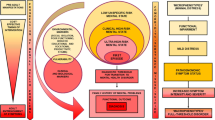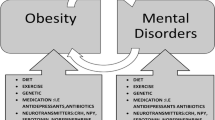Abstract
Type 2 Diabetes Mellitus (T2DM) was characteristically an adult-onset illness until recently, when it became recognized as an increasing problem among youth in conjunction with escalating rates and associated risks of pediatric. Youth-onset T2DM is associated with a range of psychosocial risk factors, and research underscores the relevancy of depressive symptoms and quality of life factors in illness diagnosis, management and prognosis. This review paper summarizes available findings on depression and health-related quality of life for youth-onset T2DM, and provides recommendations for clinical practice and a conceptual framework for further studies.
Similar content being viewed by others
References
Papers of particular interest, published recently, have been highlighted as: • Of importance •• Of major importance
Pinhas-Hamiel O, Dolan LM, Daniels SR, Standiford D, Khoury PR, Zeitler P. Increased incidence of non-insulin-dependent diabetes mellitus among adolescents. J Pediatr. 1996;128:608–15.
Peterson K, Silverstein J, Kaufman F, Warren-Boulton E. Management of type 2 diabetes in youth: an update. Am Fam Physician. 2007;76:658–64.
•• Springer SC, Silverstein J, Copeland K, et al. Management of type 2 diabetes mellitus in children and adolescents. Pediatrics. 2013;131:e648–64. This publication is a technical report from the American Academy of Pediatrics. featuring a systematic review of literature utilized to generate clinical practice guidelines for, “Management of Type 2 Diabetes Melllitus in Children and Adolescents”.
Zeitler P. Considerations regarding the diagnosis and treatment of childhood type 2 diabetes. Postgrad Med. 2010;122:89–97.
Rapid rise in hypertension and nephropathy in youth with type 2 diabetes: the TODAY clinical trial. Diabetes Care. 2013;36:1735–41.
Lipid and inflammatory cardiovascular risk worsens over 3 years in youth with type 2 diabetes: the TODAY clinical trial. Diabetes Care. 2013;36:1758–64.
Rhodes ET, Prosser LA, Hoerger TJ, Lieu T, Ludwig DS, Laffel LM. Estimated morbidity and mortality in adolescents and young adults diagnosed with Type 2 diabetes mellitus. Diabet Med. 2012;29:453–63.
Linder BL, Fradkin JE, Rodgers GP. The TODAY Study: an NIH perspective on its implications for research. Diabetes Care. 2013;36:1775–6.
Russell-Mayhew S, McVey G, Bardick A, Ireland A. Mental health, wellness, and childhood overweight/obesity. J Obes. 2012;2012:281801.
Fogel NR, Weissberg-Benchell J. Preventing poor psychological and health outcomes in pediatric type 1 diabetes. Curr Diab Rep. 2010;10:436–43.
•• Cefalu WT. “TODAY” reflects on the changing “Faces” of type 2 diabetes. Diabetes Care. 2013;36:1732–4. Commentary on findings related to treatment options for youth-onset type 2 diabetes and data examining rates and risks of complications associated with the condition.
Pinhas-Hamiel O, Zeitler P. Acute and chronic complications of type 2 diabetes mellitus in children and adolescents. Lancet. 2007;369:1823–31.
SEARCH for Diabetes in Youth: a multicenter study of the prevalence, incidence and classification of diabetes mellitus in youth. Control Clin Trials. 2004;25:458–71.
Tamborlane WV, Klingensmith G. Crisis in care: limited treatment options for type 2 diabetes in adolescents and youth. Diabetes Care. 2013;36:1777–8.
•• Zeitler P, Hirst K, Pyle L, et al. A clinical trial to maintain glycemic control in youth with type 2 diabetes. N Engl J Med. 2012;366:2247–56. This manuscript summarizes the primary outcomes from the Treatment Options for type 2 Diabetes in Adolescents and Youth (TODAY) study.
Louis-Jacques J, Samples C. Caring for teens with chronic illness: risky business? Curr Opin Pediatr. 2011;23:367–72.
Rolland JS, Walsh F. Facilitating family resilience with childhood illness and disability. Curr Opin Pediatr. 2006;18:527–38.
Rustad JK, Musselman DL, Nemeroff CB. The relationship of depression and diabetes: pathophysiological and treatment implications. Psychoneuroendocrinology. 2011;36:1276–86.
Markowitz SM, Gonzalez JS, Wilkinson JL, Safren SA. A review of treating depression in diabetes: emerging findings. Psychosomatics. 2011;52:1–18.
Anderson RJ, Freedland KE, Clouse RE, Lustman PJ. The prevalence of comorbid depression in adults with diabetes: a meta-analysis. Diabetes Care. 2001;24:1069–78.
Nouwen A, Winkley K, Twisk J, et al. Type 2 diabetes mellitus as a risk factor for the onset of depression: a systematic review and meta-analysis. Diabetologia. 2010;53:2480–6.
Talbot F, Nouwen A. A review of the relationship between depression and diabetes in adults: is there a link? Diabetes Care. 2000;23:1556–62.
Vallance JK, Winkler EA, Gardiner PA, Healy GN, Lynch BM, Owen N. Associations of objectively-assessed physical activity and sedentary time with depression: NHANES (2005-2006). Prev Med. 2011;53:284–8.
Knol MJ, Twisk JW, Beekman AT, Heine RJ, Snoek FJ, Pouwer F. Depression as a risk factor for the onset of type 2 diabetes mellitus. A meta-analysis. Diabetologia. 2006;49:837–45.
Jaser SS, Holl MG, Jefferson V, Grey M. Correlates of depressive symptoms in urban youth at risk for type 2 diabetes mellitus. J Sch Health. 2009;79:286–92.
de Groot M, Anderson R, Freedland KE, Clouse RE, Lustman PJ. Association of depression and diabetes complications: a meta-analysis. Psychosom Med. 2001;63:619–30.
Lin EH, Heckbert SR, Rutter CM, et al. Depression and increased mortality in diabetes: unexpected causes of death. Ann Fam Med. 2009;7:414–21.
• Baumeister H, Hutter N, Bengel J. Psychological and pharmacological interventions for depression in patients with diabetes mellitus and depression. Cochrane Database Syst Rev. 2012;12, CD008381. A review of the literature on behavioral health treatments for depression in patients with diabetes, summarizing glycemic and mental health outcomes.
van Dooren FE, Nefs G, Schram MT, Verhey FR, Denollet J, Pouwer F. Depression and risk of mortality in people with diabetes mellitus: a systematic review and meta-analysis. PLoS One. 2013;8:e57058.
Park M, Katon WJ, Wolf FM. Depression and risk of mortality in individuals with diabetes: a meta-analysis and systematic review. Gen Hosp Psychiatry. 2013;35:217–25.
Bakas T, McLennon SM, Carpenter JS, et al. Systematic review of health-related quality of life models. Health Qual Life Outcome. 2012;10:134.
Schunk M, Reitmeir P, Schipf S, et al. Health-related quality of life in subjects with and without Type 2 diabetes: pooled analysis of 5 population-based surveys in Germany. Diabet Med. 2012;29:646–53.
Green AJ, Fox KM, Grandy S. Self-reported hypoglycemia and impact on quality of life and depression among adults with type 2 diabetes mellitus. Diabetes Res Clin Pract. 2012;96:313–8.
Landman GW, van Hateren KJ, Kleefstra N, Groenier KH, Gans RO, Bilo HJ. Health-related quality of life and mortality in a general and elderly population of patients with type 2 diabetes (ZODIAC-18). Diabetes Care. 2010;33:2378–82.
Li TC, Lee YD, Liu CS, Chen CC, Li CI, Lin CC. Disease-specific quality-of-life measures as predictors of mortality in individuals living with type 2 diabetes. J Psychosom Res. 2011;70:155–60.
Anderson RT, Narayan KM, Feeney P, et al. Effect of intensive glycemic lowering on health-related quality of life in type 2 diabetes: ACCORD trial. Diabetes Care. 2011;34:807–12.
Grandy S, Fox KM, Bazata DD. Association of self-reported weight change and quality of life, and exercise and weight management behaviors among adults with type 2 diabetes mellitus: the SHIELD study. Cardiol Res Pract. 2012;2012, 892564.
Williamson DA, Rejeski J, Lang W, Van Dorsten B, Fabricatore AN, Toledo K. Impact of a weight management program on health-related quality of life in overweight adults with type 2 diabetes. Arch Intern Med. 2009;169:163–71.
Kalarchian MA, Marcus MD. Psychiatric comorbidity of childhood obesity. Int Rev Psychiatry. 2012;24:241–6.
Levitt Katz LE, Swami S, Abraham M, et al. Neuropsychiatric disorders at the presentation of type 2 diabetes mellitus in children. Pediatr Diabetes. 2005;6:84–9.
Block WM, Putzer GJ, Jaramillo JR. Children with type 2 diabetes mellitus and the prevalence of psychiatric disorders. South Med J. 2010;103:1214–8.
Anderson BJ, Edelstein S, Abramson NW, et al. Depressive symptoms and quality of life in adolescents with type 2 diabetes: baseline data from the TODAY study. Diabetes Care. 2011;34:2205–7.
Wilfley D, Berkowitz R, Goebel-Fabbri A, et al. Binge eating, mood, and quality of life in youth with type 2 diabetes: baseline data from the today study. Diabetes Care. 2011;34:858–60.
Hood KK, Lawrence JM, Anderson A, et al. Metabolic and inflammatory links to depression in youth with diabetes. Diabetes Care. 2012;35:2443–6.
Schwimmer JB, Burwinkle TM, Varni JW. Health-related quality of life of severely obese children and adolescents. JAMA. 2003;289:1813–9.
Nadeau K, Kolotkin RL, Boex R, et al. Health-related quality of life in adolescents with comorbidities related to obesity. J Adolesc Health. 2011;49:90–2.
Swallen KC, Reither EN, Haas SA, Meier AM. Overweight, obesity, and health-related quality of life among adolescents: the National Longitudinal Study of Adolescent Health. Pediatrics. 2005;115:340–7.
Varni JW, Limbers CA, Burwinkle TM, Bryant WP, Wilson DP. The ePedsQL in type 1 and type 2 diabetes: feasibility, reliability, and validity of the Pediatric Quality of Life Inventory Internet administration. Diabetes Care. 2008;31:672–7.
Allan CL, Flett B, Dean HJ. Quality of life in First Nation youth with type 2 diabetes. Matern Child Health J. 2008;12 Suppl 1:103–9.
Rhodes ET, Goran MI, Lieu TA, et al. Health-related quality of life in adolescents with or at risk for type 2 diabetes mellitus. J Pediatr. 2012;160:911–7.
Naughton MJ, Ruggiero AM, Lawrence JM, et al. Health-related quality of life of children and adolescents with type 1 or type 2 diabetes mellitus: SEARCH for Diabetes in Youth Study. Arch Pediatr Adolesc Med. 2008;162:649–57.
Anderson BJ, Cullen K, McKay S. Quality of life, family behavior, and health outcomes in children with type 2 diabetes. Pediatr Ann. 2005;34:722–9.
Fisher L, Hessler DM, Polonsky WH, Mullan J. When is diabetes distress clinically meaningful?: establishing cut points for the Diabetes Distress Scale. Diabetes Care. 2012;35:259–64.
Delamater AM. Psychological care of children and adolescents with diabetes. Pediatr Diabetes. 2009;10 Suppl 12:175–84.
Bitsko MJ, Bean MK, Bart S, Foster RH, Thacker L, Francis GL. Psychological treatment improves hemoglobin a1c outcomes in adolescents with type 1 diabetes mellitus. J Clin Psychol Med Settings. 2013;20:333–42.
Roy T, Lloyd CE, Pouwer F, Holt RI, Sartorius N. Screening tools used for measuring depression among people with Type 1 and Type 2 diabetes: a systematic review. Diabet Med. 2012;29:164–75.
Winkley K, Ismail K, Landau S, Eisler I. Psychological interventions to improve glycaemic control in patients with type 1 diabetes: systematic review and meta-analysis of randomised controlled trials. BMJ. 2006;333:65.
Pinhas-Hamiel O, Zeitler P. Clinical presentation and treatment of type 2 diabetes in children. Pediatr Diabetes. 2007;8 Suppl 9:16–27.
Barsky AJ. Amplification, somatization, and the somatoform disorders. Psychosomatics. 1992;33:28–34.
Compliance with Ethics Guidelines
Conflict of Interest
Natalie Walders-Abramson has been a consultant for Daiichi Sankyo Pharma Development.
Human and Animal Rights and Informed Consent
This article does not contain any studies with human or animal subjects performed by any of the authors.
Author information
Authors and Affiliations
Corresponding author
Additional information
This article is part of the Topical Collection on Pediatric Type 2 Diabetes
Rights and permissions
About this article
Cite this article
Walders-Abramson, N. Depression and Quality of Life in Youth-Onset Type 2 Diabetes Mellitus. Curr Diab Rep 14, 449 (2014). https://doi.org/10.1007/s11892-013-0449-x
Published:
DOI: https://doi.org/10.1007/s11892-013-0449-x




